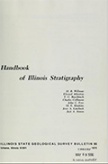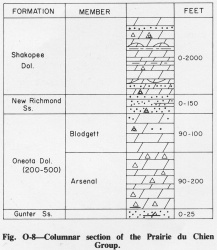Historical:Prairie du Chien Group
Lithostratigraphy: Knox Dolomite Megagroup >>Prairie du Chien Group
Chronostratigraphy: Paleozoic Erathem >>Ordovician System >>Canadian Series >>Trempealeauan Stage
Allostratigraphy: Sauk Sequence
Authors
H. B. Willman and T. C. Buschbach
Name Origin
The Prairie du Chien Group is named for exposures near Prairie du Chien, Crawford County, Wisconsin, where it consists of 200-300 feet of dolomite and sandstone.
Other Names
The Prairie du Chien Group is equivalent to Beekmantown strata in Ohio, upper Knox in Tennessee, and upper Arbuckle in Oklahoma.
Extent and Thickness
The group is present throughout much of Illinois (fig. O-7). It is almost entirely absent in the northern two tiers of counties and is missing locally in the rest of the northern third of the state, having been removed by solution and erosion before the St. Peter Sandstone was deposited. It is also absent in areas where Cambrian rocks crop out near the Sandwich Fault Zone, on the Ashton Arch, and on the Oregon Anticline. Prairie du Chien strata crop out along the Fox and Rock Valleys, mainly just south of the Sandwich Fault Zone. The group thickens southward, chiefly by the addition of younger beds at the top, to about 800 feet along a line between Edgar and Monroe Counties. South of there, the base of the Prairie du Chien cannot be picked with confidence, but the group appears to thicken to at least 2500 feet.
Stratigraphic Position
The Prairie du Chien Group (Bain, 1906, p. 18) includes all strata of Canadian age in Illinois. In the southern part of the state, Prairie du Chien strata combine with the underlying Cambrian carbonates to form the Knox Dolomite Megagroup.
Description
The Prairie du Chien Group consists of cherty dolomite with some interbedded sandstone. It is subdivided into the Gunter Sandstone (at the base), the Oneota Dolomite, the New Richmond Sandstone, and the Shakopee Dolomite (fig. O-8).
References
BAIN, H. F., 1906, Zinc and lead deposits of the Upper Mississippi Valley: USGS Bulletin 294, 155 p.
ISGS Codes
| Stratigraphic Code | Geo Unit Designation |
|---|---|


